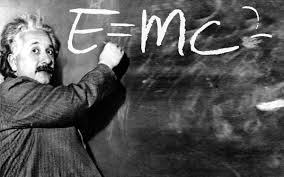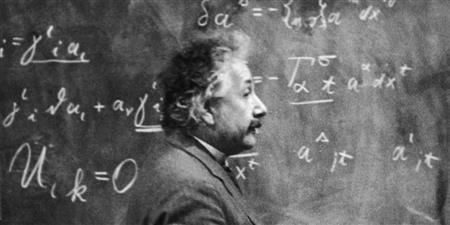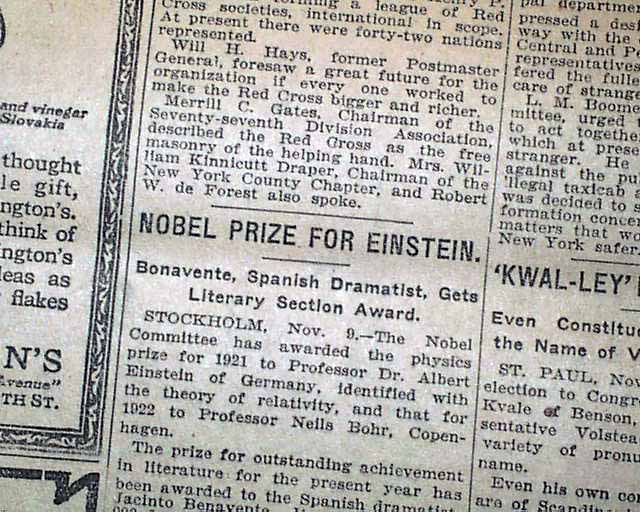 |
| Einstein writing the famous equation E=MC squared (https://stevesimms.wordpress.com ()) |
E=MC2 is a formula most of us are familiar with. It was invented by someone whom we are all familiar with. Albert Einstein, the man who revolutionized science. Einstein was born in Ulm, Germany in 1879. While Einstein was a student at Luitpold-Gymnasium, in Munich, his parents moved to Italy. After six months, Einstein left school without graduating to join his family in Milan. "In 1895, he traveled to Zurich to take the entrance examination at the Swiss Polytechnic Institute, where a high school degree was not required. He failed the exam, but, after a year of study at the Aarau gymnasium, he retook and passed the exam. Four years later, Einstein received his degree from the Institute."("Albert Einstein." World ) After graduating, Einstein accepted a job at the Swiss Patent Office in Bern. The best part of this job was that it afforded Einstein time to work on his scientific theories. "During the seven years that he worked at the Patent Office, Einstein was able to complete the work necessary for his doctorate at the University of Zurich and to write three of the most significant papers in the history of science."("Albert Einstein." World ) The ideas that Einstein espoused in these papers would revolutionize the scientific world. Einstein's formula, E=MC2, enabled the creation of the atomic bomb and helped end WWII. Einstein is a hero because he used his intelligence to improve the lives of others, and to change the way people view the world. He spent his life making sacrifices for the benefit of humanity. Albert Einstein is truly a hero because of his willingness to sacrifice for the better good.
 |
| (http://www.businessinsider.com/ (Einstein using his time for work.)) |
Einstein was willing to sacrifice his time and energy for the better good which makes him a hero. He wanted the president of the U.S to oversee the creation of the atomic bomb. Einstein realized that Hitler would cause trouble for the world: "With the advent of World War II, Einstein recognized the threat posed by Germany's hegemonic ambitions and advanced scientific knowledge, and actively encouraged President Franklin D. Roosevelt to develop the atomic bomb" ("Albert Einstein." DISCovering Authors ). Einstein fled Germany in order to warn the U.S. that Hitler was planning to go to war. As a pacifist, Einstein worked hard to stop the world war. He used his reputation to speak out, sacrificing his time for a cause he believed in: "Since the outbreak of World War I, Einstein had been opposed to war, and used his notoriety to lecture against it during the 1920s and 1930s. With the rise of National Socialism in Germany in the early 1930s, Einstein's position became difficult. Although he had renewed his German citizenship, he was suspect as both a Jew and a pacifist. In addition, his writings about relativity were in conflict with the absolutist teachings of German leader Adolf Hitler's party" ("Albert Einstein." American Decades). Despite the danger he faced as a suspected Jew under the Nazi regime, Einstein continued to speak his mind. His work contradicted Hitler. But he still did research. He completely sacrificed his social standing for the better good of the world. Albert Einstein sacrificed for the world, no matter what it took; he sacrificed himself for the better good. This makes him a hero.
 |
| A newspaper saying that Einstein won a Nobel prize (http://www.rarenewspapers.com ()) |
Einstein's incredible intelligence enabled him to push the boundaries of science. Einstein wrote about his theories in three papers that revolutionized science: "These three masterpieces dealt with Brownian motion, the photoelectric effect, and the special theory of relativity. In 1921, he was awarded the Nobel Prize in physics for his explanation of the photoelectric effect. Einstein extended his special theory of relativity into the more general theory of relativity, which he formulated into the well-known equation E=mc2" (:"Albert Einstein." Scientists: Their Lives and Works). His famous equation, E=mc2, enabled future scientists to create the atomic bomb. The equation revealed the enormous amount of energy stored in atoms. Releasing that energy created the atomic bomb, which is credited with ending WWII. Albert Einstein revolutionized science with his thinking. His papers won him the Nobel prize in physics, along with many other awards: "Nobel Prize in Physics, 1921; Copley Medal, Royal Society of London, 1925; Gold Medal, Royal Astronomical Society, London, 1926; Franklin Institute Medal, 1935" ("Albert Einstein." DISCovering Authors ). Einstein was able to calculate things that others wouldn't have dreamed possible: "Einstein had calculated that the amount of light bent by the sun would amount to 1.7 seconds of an arc, a small but detectable effect. In 1919, during an eclipse of the sun, English astronomer Arthur Eddington measured the deflection of starlight and found it to be 1.61 seconds of an arc, well within experimental error" ("Albert Einstein." American Decades). This was important for our understanding of the universe. Before Einstein, scientists thought of gravity as a force and did not think that it could bend light. Einstein showed us that it was instead a curvature in space-time and that it could bend light. Einstein clearly had the intelligence it takes to be a hero, and was one of the most renowned scientists there has ever been.
Einstein was, in his lifetime, an incredibly intelligent person, and willing to sacrifice for others. This makes him the hero of his day, because he sacrificed for the better good of his country and the world: " He gave generously of his time and energy to causes he supported, enduring harsh criticism and even risking death as a result of the stands he took on some of the major issues of his day" (:"Albert Einstein." Scientists: Their Lives and Works). He was also incredibly intelligent. So much so, that he calculated the light bent by the sun almost to the decimal. Einstein is an inspiration because of all of his heroic traits that make him a great person, and his unique scientific insights that changed the world:"Albert Einstein is generally acknowledged as the preeminent scientist of the twentieth century who challenged and disproved fundamental ideas concerning the physical universe"("Albert Einstein." DISCovering Authors). Einstein has inspired me to work hard and do whatever it takes to achieve my goal. He has been an inspiration to me and everyone else who knows about him. I have been inspired to go beyond my comfort zone, and even give up things of my own to help others. As the famous scientist who created one of the most well known formulas, E=MC2, Einstein has inspired many to someday be as great as he once was. Works Cited "Albert Einstein." American Decades, edited by Judith S. Baughman, et al., Gale, 1998. Biography in Context, link.galegroup.com/apps/doc/K1602000416/BIC1?u=powa9245&xid=e6dbc469. "Albert Einstein." DISCovering Authors, Gale, 2003. Student Resources in Context, link.galegroup.com/apps/doc/EJ2101101442/SUIC?u=powa9245&xid=148136ac "Albert Einstein." Scientists: Their Lives and Works, UXL, 2006. Research in Context, go.galegroup.com/ps/i.do?p=MSIC&sw=w&u=powa9245&v=2.1&id=GALE%7CK2641500058&it=r&asid=27289893217c8100569315caf2c1d4ad. Cassidy, David. "Einstein Exhibit." Einstein Exhibit, history.aip.org/history/exhibits/einstein/great1.htm. "Albert Einstein." World of Scientific Discovery, Gale, 2006. Biography in Context, link.gale group.com/apps/doc/K1648000191/BIC1?u=powa9245&xid=0e1e605d. Accessed 2 Feb. 2017.
Page created on 2/6/2017 12:00:00 AM
Last edited 2/6/2017 12:00:00 AM
